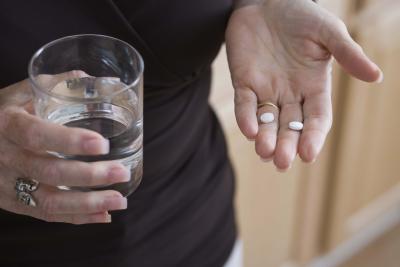Once you’ve determined that you have a hyperactive kid, you may feel pressure to medicate him. Maybe the school administrators are telling you that medication can help your child do better in school. It may, but medication is not the only option you have for treating a hyperactive kid or a kid who has attention-deficit hyperactivity disorder.
Hyperactive Kids
Hyperactive kids typically have trouble paying attention in school, are more active or impulsive than other kids, often lose things and are easily distracted. They can be fidgety, blurt out answers in school, have trouble waiting in line, interrupt people and have difficulty sitting still or playing quietly.
Stimulants
It may sound odd, but stimulants such as Ritalin, Adderall and Dexedrine are the drugs of choice to medicate hyperactive kids. They work by increasing dopamine levels. By increasing dopamine, you increase pleasure, motivation and attention, helping your kid to focus and concentrate. Not surprisingly, many teens who are not prescribed these medications like to abuse them because these pills give them a boost when cramming for tests or to help them lose weight. If you decide to get a stimulant medication for your child, make sure that she doesn’t share her pills.
Stimulant Side Effects
If you give your child stimulants for his hyperactivity, he might experience side effects, such as feeling restless, loss of appetite, headaches, mood swings and depression. He may also become withdrawn, listless, less talkative and less spontaneous. Stimulants also raise heart rate and blood pressure. The American Heart Association recommends that your child have a cardiac evaluation prior to starting on a stimulant. You must monitor the medication’s effects while your child takes it. Give your child the lowest possible dose.
Lifestyle Changes
Medications for hyperactive kids are not magic pills. The pills won’t cure your child; the best they can do is to relieve symptoms. Medications won’t solve all your child’s problems, either. A hyperactive child needs lifestyle changes in addition to any medication. Eating healthy foods, getting enough exercise and sleep and having an organized household can help a hyperactive child.
Food, Exercise, Sleep and Routines
What and when you eat can affect your mood and your energy level. Not only should you limit junk food and sugary drinks, your child should eat on a schedule. Exercise is one of the best methods to alleviate hyperactive symptoms because exercise naturally boosts the brain’s dopamine levels. Hyperactive kids often have difficulty falling asleep and have difficulty waking up as a result. This makes a child irritable. By implementing a quiet time one or two hours before bed and by enforcing a regular bedtime, you can help your child sleep better. Routines and simple schedules help your child keep focused and on track. Try the behavioral techniques first before you start your child on medication.





